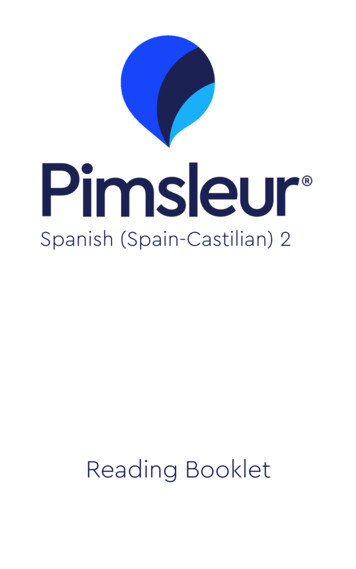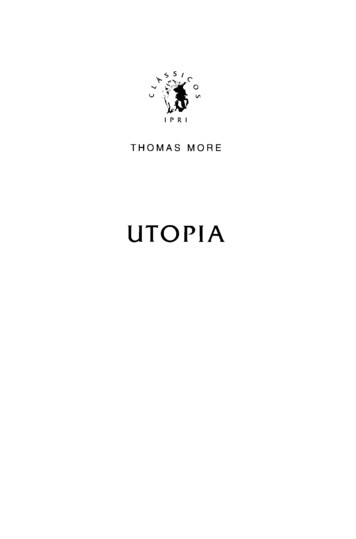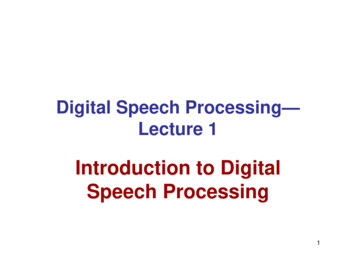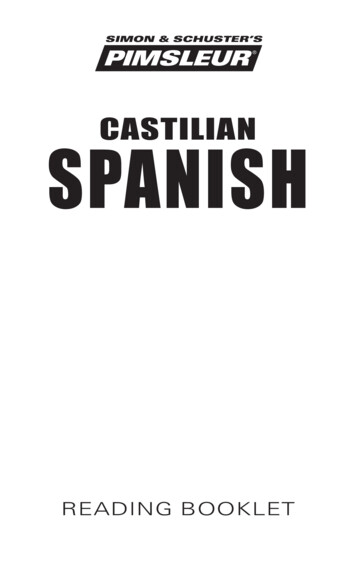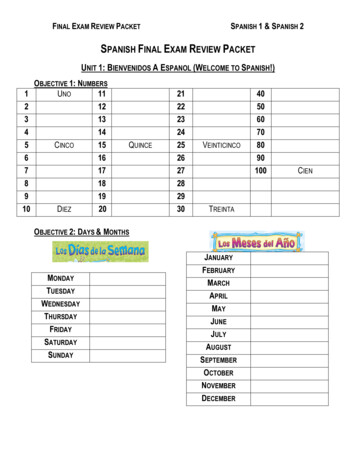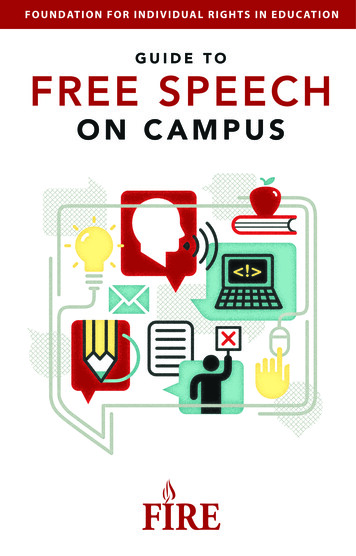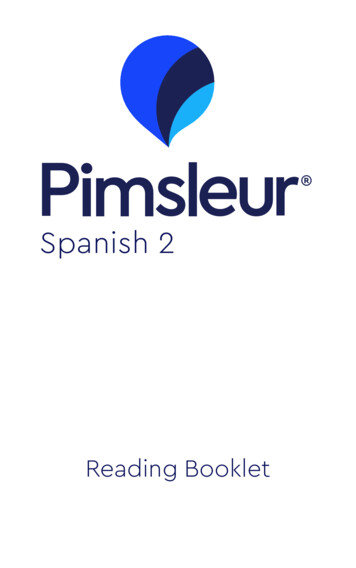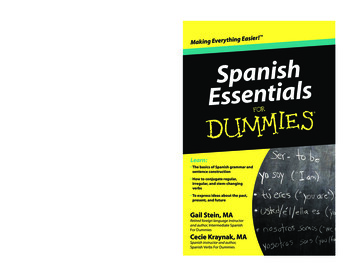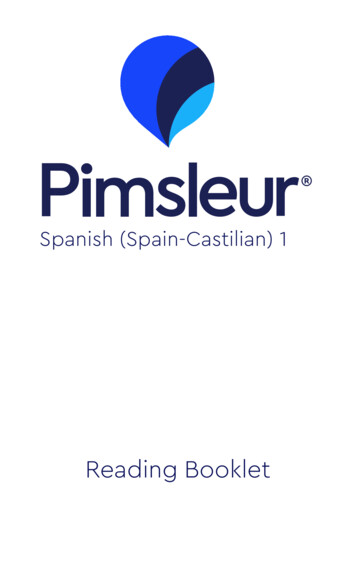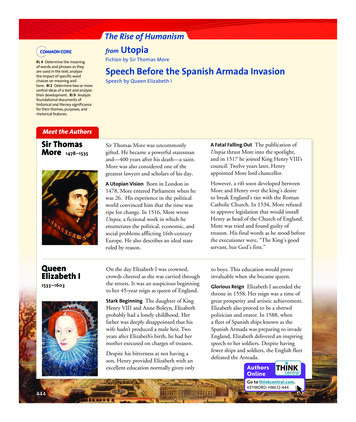
Transcription
The Rise of HumanismfromRL 4 Determine the meaningof words and phrases as theyare used in the text; analyzethe impact of specific wordchoices on meaning andtone. RI 2 Determine two or morecentral ideas of a text and analyzetheir development. RI 9 Analyzefoundational documents ofhistorical and literary significancefor their themes, purposes, andrhetorical features.UtopiaFiction by Sir Thomas MoreSpeech Before the Spanish Armada InvasionSpeech by Queen Elizabeth IMeet the AuthorsSir ThomasMore 1478–1535Sir Thomas More was uncommonlygifted. He became a powerful statesmanand—400 years after his death—a saint.More was also considered one of thegreatest lawyers and scholars of his day.A Utopian Vision Born in London in1478, More entered Parliament when hewas 26. His experience in the politicalworld convinced him that the time wasripe for change. In 1516, More wroteUtopia, a fictional work in which heenumerates the political, economic, andsocial problems afflicting 16th-centuryEurope. He also describes an ideal stateruled by reason.QueenElizabeth IOn the day Elizabeth I was crowned,crowds cheered as she was carried throughthe streets. It was an auspicious beginningto her 45-year reign as queen of England.1533–1603Stark Beginning The daughter of KingHenry VIII and Anne Boleyn, Elizabethprobably had a lonely childhood. Herfather was deeply disappointed that hiswife hadn’t produced a male heir. Twoyears after Elizabeth’s birth, he had hermother executed on charges of treason.Despite his bitterness at not having ason, Henry provided Elizabeth with anexcellent education normally given onlyA Fatal Falling Out The publication ofUtopia thrust More into the spotlight,and in 1517 he joined King Henry VIII’scouncil. Twelve years later, Henryappointed More lord chancellor.However, a rift soon developed betweenMore and Henry over the king’s desireto break England’s ties with the RomanCatholic Church. In 1534, More refusedto approve legislation that would installHenry as head of the Church of England.More was tried and found guilty oftreason. His final words as he stood beforethe executioner were, “The King’s goodservant, but God’s first.”to boys. This education would proveinvaluable when she became queen.Glorious Reign Elizabeth I ascended thethrone in 1558. Her reign was a time ofgreat prosperity and artistic achievement.Elizabeth also proved to be a shrewdpolitician and orator. In 1588, whena fleet of Spanish ships known as theSpanish Armada was preparing to invadeEngland, Elizabeth delivered an inspiringspeech to her soldiers. Despite havingfewer ships and soldiers, the English fleetdefeated the neOnlineGoGo toto thinkcentral.comtthhiinnkkccenenttrraall coommGoto thinkcentral.com.KEYWORD:HML11-####KEYWORD: HML12-444444NA L12PE-u02s31-brUtopia.indd44412/30/1011:03:58 AM
text analysis: rhetorical devicesBoth Sir Thomas More and Elizabeth I use rhetorical devices—techniques that communicate their ideas and support andstrengthen their arguments. As you read, pay attention to theiruse of the following techniques: An analogy is a comparison made between two dissimilarthings in order to explain an unfamiliar subject in terms ofa familiar one. For example, More compares a bad rulerto an incompetent physician who cannot cure a diseaseexcept by creating another. Repetition is the repeated use of a word or phrase. Forexample, Elizabeth I repeats the phrase “I myself” toemphasize her personal involvement in England’s defense. A rhetorical question is a question to which no answer isexpected. (Who is more eager for revolution than he who isdiscontented with his present state of life?) Antithesis expresses contrasting ideas in parallel grammaticalstructures. (I know I have the body but of a weak and feeblewoman; but I have the heart and stomach of a king. . . .)reading skill: draw conclusionsWhen you draw conclusions about a text, you make judgmentsabout the author’s meaning based on statements in the text.For example, if a writer consistently criticizes corruption inpublic officials, you might conclude that the writer valueshonesty and integrity. As you read the following selections,note ideas and supporting details that Thomas More andQueen Elizabeth consistently include that help you drawconclusions about their views of the proper role of a ruler.What should weexpect from ourleaders?During the Renaissance, a nation’sleaders did not have to run for office.However, both Sir Thomas More andElizabeth I suggest that even kings andqueens must demonstrate effectiveleadership to win the support of theirpeople.SURVEY What qualities do you thinkare important in a leader? Rate eachquality listed below by choosing anumber from 1 (least important) to 5(most important). Discuss your ratingswith a classmate.Leadership QualitiesRate the importance of each qualityby circling a number.leastmostIntelligence ma12345vocabulary in contextThe words shown here help convey Elizabeth I’s and SirThomas More’s convictions about what constitutes a goodruler. Replace the boldfaced word in each of the followingsentences with a word from the ion1. Loud weeping was heard at the good king’s funeral.2. The conquerors began looting the village after the battle.3. As a result of his idleness, the bridge was never built.Complete the activities in your Reader/Writer Notebook.445NA L12PE-u02s31-brUtopia.indd44511/24/1011:56:42 AM
ut opiaSir Thomas More102030Suppose I should show that men choose a king for their own sake and not forhis—to be plain, that by his labor and effort they may live well and safe frominjustice and wrong. For this very reason, it belongs to the king to take more carefor the welfare of his people than for his own, just as it is the duty of a shepherd,insofar as he is a shepherd, to feed his sheep rather than himself.1 aThe blunt facts reveal that it is wrong to think that the poverty of the people isthe safeguard of peace. Where will you find more quarreling than among beggars?Who is more eager for revolution than he who is discontented with his presentstate of life? Who is more reckless in the endeavor to upset everything, in the hopeof getting profit from some source or other, than he who has nothing to lose? Nowif there were any king who was either so despicable or so hateful to his subjects thathe could not keep them in subjection otherwise than by ill usage, plundering,and confiscation and by reducing them to beggary, it would surely be better forhim to resign his throne than to keep it by such means—means by which, thoughhe retain the name of authority, he loses its majesty. It is not consistent with thedignity of a king to exercise authority over beggars but over prosperous and happysubjects. This was certainly the sentiment of that noble and lofty spirit, Fabricus,who replied that he would rather be a ruler of rich people than be rich himself.2To be sure, to have a single person enjoy a life of pleasure and self-indulgenceamid the groans and lamentations of all around him is to be the keeper, not ofa kingdom, but of a jail. In fine,3 as he is an incompetent physician who cannotcure one disease except by creating another, so he who cannot reform the lives ofcitizens in any other way than by depriving them of the good things of life mustadmit that he does not know how to rule free men.Yea, the king had better amend his own indolence or arrogance, for these twovices generally cause his people to either despise him or to hate him. Let him liveharmlessly on what is his own. Let him adjust his expenses to his revenues. Lethim check mischief and crime, and, by training his subjects rightly, let him preventrather than allow the spread of activities which he will have to punish afterwards.Let him not be hasty in enforcing laws fallen into disuse, especially those which,long given up have never been missed. Let him never take in compensation forviolation anything that a private person would be forbidden in court to appropriatefor the reason that such would be an act of crooked craftiness.4 ba RHETORICAL DEVICESReread lines 1–5. Whatrhetorical device doesMore use? How does itstrengthen his argument?subjection (sEb-jDkPshEn)n. the state of beingunder the authority orcontrol of anotherplundering (plOnPdEr-Gng)n. taking property byforce plunder v.lamentation(lBmQEn-tAPshEn) n. anexpression of sorrowor regretindolence (GnPdE-lEns)n. the tendency to avoidwork; laziness; idlenessb GRAMMAR AND STYLEReread lines 26–33.Note that More uses asuccession of imperativesentences to convey hisideas about how a kingshould behave.1. the duty of a shepherd . . . himself: More’s metaphor paraphrases the Bible (Ezekiel 34:2): “Woe be to theshepherds of Israel that do feed themselves: should not the shepherds feed the flocks?”2. Fabricus . . . himself: Gaius Fabricius Luscinus was a Roman commander famous for his virtues. Thestatement attributed to him here was actually made by his associate M. Curius Dentatus.3. in fine: in conclusion.4. an act of crooked craftiness: sly, dishonest behavior.446unit 2: the english renaissanceNA L12PE-u02s31-Utopia.indd446Bishop Sherbourne with Henry VIII (1800s), Louise Barnard. ChichesterCathedral, Sussex, United Kingdom. Bridgeman Art Library.11/24/1011:56:05 AM
NA L12PE-u02s31-Utopia.indd44711/24/1011:56:21 AM
speech before theSpanish ArmadaInvasionQueen Elizabeth IMY LOVING PEOPLE,1020We have been persuaded by some that are careful of our safety, to take heed howwe commit our selves to armed multitudes, for fear of treachery; but I assure youI do not desire to live to distrust my faithful and loving people. Let tyrants fear, Ihave always so behaved myself that, under God, I have placed my chiefest strengthand safeguard in the loyal hearts and good-will of my subjects; and therefore I amcome amongst you, as you see, at this time, not for my recreation and disport,1but being resolved, in the midst and heat of the battle, to live or die amongst youall; to lay down for my God, and for my kingdom, and my people, my honorand my blood, even in the dust. I know I have the body but of a weak and feeblewoman; but I have the heart and stomach of a king, and of a king of England too,and think foul scorn that Parma or Spain, or any prince of Europe,2 should dare toinvade the borders of my realm; to which rather than any dishonor shall grow byme, I myself will take up arms, I myself will be your general, judge, and rewarderof every one of your virtues in the field. I know already, for your forwardness youhave deserved rewards and crowns; and We do assure you in the word of a prince,they shall be duly paid you. In the mean time, my lieutenant general shall be inmy stead,3 than whom never prince commanded a more noble or worthy subject;not doubting but by your obedience to my general, by your concord4 in the camp,and your valor in the field, we shall shortly have a famous victory over thoseenemies of my God, of my kingdom, and of my people. c dPortrait of Elizabeth I, Queen ofEngland (1500s), Anonymous.National Portrait Gallery, London. Bildarchiv Preussischer Kulturbesitz/Art Resource, New York.L 5acPARADOXA paradox is an apparentcontradiction that isactually true. During theRenaissance, to be bothfemale and the powerfulruler of a nation was acontradiction in terms.As the female ruler ofEngland, Queen ElizabethI was herself a paradox.Reread lines 10–11. Howdoes this rhetorical devicehelp Elizabeth presentherself as a powerfulfemale monarch? Howdoes she expand on thisparadox in the course ofher speech to inspire herpeople?1. disport: entertainment.2. Parma or Spain . . . Europe: the duke of Parma, the king of Spain, or any other monarch of Europe.Alessandro Farnese, duke of the Italian city of Parma, was a skillful military leader whom Philip II, kingof Spain, often relied upon. Philip’s plan was to send the Spanish fleet to join the army under Parma’scommand in the Netherlands and invade England.3. my lieutenant general . . . stead: Elizabeth refers to Robert Dudley, the earl of Leicester. He was a courtierwho for a time was Elizabeth’s favorite at court.d DRAW CONCLUSIONSReread lines 17–21. Whatconclusions can youdraw about the kinds offeelings a ruler shouldinspire in times of war?4. concord (kJnPkôrdQ) n. friendly and peaceful relations; harmony; agreement448unit 2: the english renaissanceNA L12PE-u02s31-Utopia.indd44811/24/1011:56:27 AM
After ReadingComprehension1. Recall According to Sir Thomas More, what should a king’s labor and effortsecure for his people?2. Recall Why does More think it is in a king’s interest to ensure the prosperityof his people?3. Summarize What does Elizabeth I claim she will do if “any prince of Europe”dares to invade her realm?Text AnalysisRL 4 Determine the meaningof words and phrases as theyare used in the text; analyzethe impact of specific wordchoices on meaning andtone. RI 2 Determine two or morecentral ideas of a text and analyzetheir development. RI 9 Analyzefoundational documents ofhistorical and literary significancefor their themes, purposes, andrhetorical features.4. Understand Persuasive Techniques Persuasive techniques are the methodswriters use to influence others to accept their views. How does More appealto the values of kings to persuade them not to impoverish their subjects?5. Analyze Rhetorical Devices Reread lines 6–10 in the selection from Utopia.What effect do these rhetorical questions produce? How do they helpsupport More’s argument? Reread lines 21–24. What does More emphasizethrough the use of an analogy in this sentence?6. Draw Conclusions Review the notes you took as you read the two selections.What conclusions can you draw about what Elizabeth felt was the proper roleof a ruler? Do you think More would have approved of her governing style?Explain your ideas using specific details.7. Compare Tone The expression of a writer’sattitude toward a subject is tone. For eachselection, use a graphic organizer like theone shown to record words and details thatconvey the tone. What similarities in tonedo you find in Utopia and Elizabeth’s speech?In what ways do these texts differ in tone?UtopiaWords and Details:Tone:Text Criticism8. Social Context Most women had little or no role outside the home in 16thcentury England, yet Elizabeth I successfully ruled the country. What detailsin her speech suggest how she gained the respect of her subjects as a rulerwho would fight to defend her country?What should we expect from ourleaders?Under what circumstances may a leader benefit from revealing a personalflaw? Under what circumstances may it hurt a leader to do so?utopia / speech before the spanish armada invasionNA L12PE-u02s31-arUtopia.indd4494491/8/1112:28:44 PM
Vocabulary in Contextvocabulary practiceword listDecide whether the boldfaced words make the statements true or false.indolencelamentation1. A slave is in a state of subjection.2. A lamentation is made in a mournful tone.3. An idle aristocrat typically displays indolence.plunderingsubjection4. Plundering does not result in damage or loss.academic vocabulary in writing attribute feature monitor phase primaryQueen Elizabeth marks an important phase in her rule when she presentsherself to her subjects as a powerful warrior. Thomas More notes that a leaderwho lacks moral integrity could not lead effectively. Write a paragraph in whichyou discuss the primary characteristics you think make someone an ineffectiveleader. Use at least one of the Academic Vocabulary words in your response.vocabulary strategy: analogies and connotationsAn analogy, which compares two terms to clarify the meaning of the lessfamiliar one, can illustrate the relationship between synonyms’ connotations.For example, you could say “Indolence is to laziness as urbanity is to politeness.”Just as indolence and laziness are synonyms, so are urbanity and politeness.However, like indolence, urbanity is a more formal term. A shorthand for thisanalogy isL 5 Demonstrate understandingof word relationships. L 6 Acquireand use accurately generalacademic words.INDOLENCE : LAZINESS :: urbanity : politenessPRACTICE Choose the item that correctly completes each analogy below. Use adictionary if necessary.1. STEALING : PLUNDERING :: criticizing :(a) pouting, (b) berating, (c) praising, (d) suggesting2. LAMENTATIONS : WHIMPERS :: accolades :(a) sincerity, (b) attacks, (c) praise, (d) criticism3. TYRANT : RULER :: hurricane :(a) tropics, (b) tranquility, (c) monsoon, (d) rainstorm4. BEAUTIFUL : EXQUISITE :: surprising :(a) shocking, (b) amusing, (c) confirming, (d) numbing5. STUPID : ASININE :: sad :(a) sorry, (b) relieved, (c) inconsolable, (d) agitated450InteractiveVocabularyGo to thinkcentral.com.KEYWORD: HML12-450unit 2: the english renaissanceNA L12PE-u02s31-arUtopia.indd4503/10/111:59:24 PM
Languagegrammar and style: Use Effective Sentence TypesReview the Grammar and Style note on page 446. Notice that Sir Thomas Moreuses a series of imperative sentences, or sentences that express a command,to pronounce how a good king should behave. By using imperative sentencesinstead of less forceful declarative sentences, More emphasizes the urgency ofhis message.Here is an example of one student’s use of imperative sentences:Follow my lead. Join me in the fight against hunger.Notice that imperative sentences begin with a verb in the active voice. Thesubject—you—is understood.L 3 Apply knowledge oflanguage to understandhow language functions indifferent contexts. W 1 Writearguments to support claims inan analysis of substantive topicsor texts, using valid reasoningand relevant and sufficientevidence. W 1a Distinguishclaims from alternate or opposingclaims. W 1b Develop claimsand counterclaims fairly andthoroughly. W 4 Produce clearand coherent writing in whichthe style is appropriate to task,purpose, and audience.PRACTICE Rewrite the following paragraph, changing some sentences to makethem imperative.You can make a difference in the lives of those less fortunate than you bygiving a contribution today. You might consider donating canned goods toyour local shelter. You could even surprise a needy family with the ingredientsfor a special meal. Together, we can defeat hunger.reading-writing connection YOURTURNExpand your understanding of Utopia and “Speech Before the SpanishArmada Invasion” by responding to this prompt. Then use the revisingtips to improve your editorial.writing promptrevising tipsWRITE AN EDITORIAL In the selection fromUtopia, Sir Thomas More explains how agood king should behave. Think of a fewimportant leaders today. Choose one, andwrite a three-to-five-paragraph editorial inwhich you express your opinions about thisleader. Consider both positive and negativeaspects of the leader’s performance. Be sureto provide instruction on how he or she couldbecome a better leader. Briefly define how youbelieve a good leader shouldbehave to help establishyour position. Briefly evaluate the leader’soverall performance to giveyour readers a context foryour opinions. Use specific details todescribe how you think theleader’s performance needsto improve. Use at least two imperativesentences in your editorialto urge the leader to change.InteractiveRevisionGo to thinkcentral.com.KEYWORD: HML12-451utopia / speech before the spanish armada invasionNA L12PE-u02s31-arUtopia.indd4514511/8/1112:28:48 PM
from Utopia Fiction by Sir Thomas More Speech Before the Spanish Armada Invasion Speech by Queen Elizabeth I Queen Elizabeth I 1533–1603 Sir Thomas More 1478–1535 Sir Thomas More was uncommonly gifted. He became a powerful statesman and—400 years after his death—a saint. More was als

